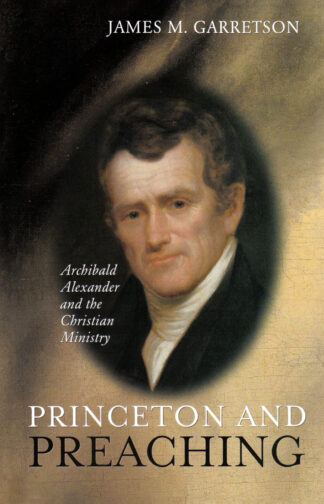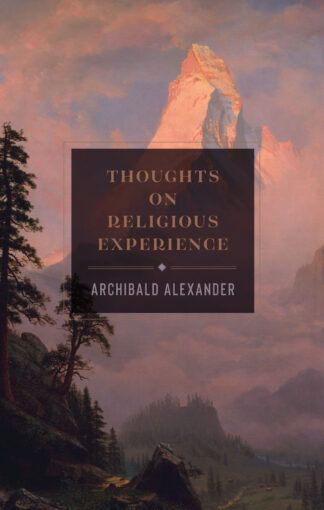Princeton And Preaching: A Review by Kenneth Stewart
A review by Kenneth J. Stewart of Princeton and Preaching: Archibald Alexander and the Christian Ministry by James M. Garretson.1
Seminarians do not often reflect upon the question of what has been the theological discipline standing behind their required courses in practical or pastoral theology. That the lecturer has a basic theological education plus accumulated ministry experience is assumed; any additional postgraduate education might well be in rhetoric, in psychology or counselling, in hermeneutics and biblical interpretation, or in a branch of ethics.
The value of James Garretson’s Princeton and Preaching is that it introduces us to an era in North American theological education – extending across many decades into the first half of the twentieth century – when pastoral theology and homiletics were regularly taught by systematic theologians who had acquired the credentials for teaching in this second discipline by their own extended pastoral and pulpit ministry. While the particular focus of Garretson’s study is the career of Archibald Alexander (1772-1851) of Princeton, the same role of theologian doubling as pastoral theologian would go on being exemplified in the careers of others like him such as the Virginian, Robert L. Dabney (1820-98) and W. G. T. Shedd (1820-1894) of Union Seminary, New York.
Yet, the ironic twist, highlighted by Garretson’s volume (which began as a Westminster Seminary, Escondido, D .Min. research project) is that whereas Dabney and Shedd’s role as pastor-theologians has been indicated by the twentieth-century republication of their nineteenth-century volumes of pastoral theology and homiletics (Dabney 1870, reprinted 1979; Shedd 1867, reprinted 1965), Archibald Alexander’s has not. This is remarkable in that Alexander was the venerable founding professor of theology at Princeton Seminary from 1812 onward. It is still more remarkable when one considers that this very old Princeton, which Alexander so exemplified, has been regularly extolled by conservative Presbyterians of various stripes as exemplifying all the theological qualities that they meant to perpetuate in new denominations and theological seminaries founded since the modernist-fundamentalist controversy of the early twentieth century. To be fair; the fault lies extensively with Alexander; while there were twentieth-century reprints of his pastoral volume, Thoughts on Religious Experience (1844, reprinted 1967)2 and his volume of eighteenth-century biographical sketches, The Log College (1851, reprint 1968), his important “Lectures on Pastoral Theology” were never published and remain in manuscript at Princeton.
Garretson, having ferreted out this fascinating material with the help of Princeton archivists, has done evangelical and Reformed pastors a real service by providing a distillation of Alexander’s lectures (enriched by use of a vast trove of unpublished sermons) in what can be called an anthology format. We are given topical treatments of the man’s considered wisdom on such subjects as call to the ministry, the minister as shepherd, and the difficulties and challenges of the Christian ministry. Woven through them all is an unmistakable emphasis on the cultivation of the personal godliness and character of the pastor as the wellspring of all labour and usefulness. The pastor’s love for Jesus Christ is the sine qua non of all. Alexander the son of godly parents, who was brought to conscious faith in Jesus Christ in the early stages of what came to be called America’s Second Great Awakening, was ever after both pietist and Calvinist. This emphasis, carried into an earnest Philadelphia pastorate and augmented by a growing theological prowess, provided the stature on the basis of which this young pastor-theologian was chosen at age 40 to commence the Presbyterian seminary at Princeton.
I am personally grateful to Garretson for carrying out what, plainly has been for him a labour of love. A seminary graduate and pastor cannot read this material without personal edification or without being stimulated to helpful reflection on what kind and type of ideals have driven one’s ministry to date. It is my hope that Garretson, who by this project has shown himself to have a firm grasp on the history of pastoral training in America, would soon find opportunity to share more of what he has uncovered – both in some seminary classroom and in the editing for publication of the very Alexander lectures on pastoral theology on which he has here drawn.
Yet, the burning question, which this research inadvertently raises, is that of the extent to which our ideas about pastoral training and pastoral theology can he, or ought to be rooted in the thought of Alexander’s (or any past) era. The impressionable seminarian of today – simply fitted out on the plan that an Alexander, a Dabney, or a Shedd would instill from two centuries ago – would be a walking anachronism. Yet, to return to our point of departure, the strength of these old pastoral theologies is that they were theologies produced by theologian-pastors who, because steeped in Scripture and sound theological learning, dealt with perennial fundamental pastoral questions in very substantive ways. Today’s seminarians could well be leavened with the perspectives of these writers to their and the churches’ great profit.
Notes

Princeton and Preaching
Archibald Alexander and the Christian Ministry
price $25.20Description
A review by Kenneth J. Stewart of Princeton and Preaching: Archibald Alexander and the Christian Ministry by James M. Garretson.1 Seminarians do not often reflect upon the question of what has been the theological discipline standing behind their required courses in practical or pastoral theology. That the lecturer has a basic theological education plus accumulated […]

price From: $13.50Description
A review by Kenneth J. Stewart of Princeton and Preaching: Archibald Alexander and the Christian Ministry by James M. Garretson.1 Seminarians do not often reflect upon the question of what has been the theological discipline standing behind their required courses in practical or pastoral theology. That the lecturer has a basic theological education plus accumulated […]
Kenneth J. Stewart is Professor of Theological Studies, Covenant College, Lookout Mountain, Georgia. USA.
Reprinted with permission from the Calvin Theological Journal, November 2006.
Latest Articles
Finished!: A Message for Easter March 28, 2024
Think about someone being selected and sent to do an especially difficult job. Some major crisis has arisen, or some massive problem needs to be tackled, and it requires the knowledge, the experience, the skill-set, the leadership that they so remarkably possess. It was like that with Jesus. Entrusted to him by God the Father […]
Every Christian a Publisher! February 27, 2024
The following article appeared in Issue 291 of the Banner Magazine, dated December 1987. ‘The Lord gave the word; great was the company of those that published it’ (Psalm 68.11) THE NEED FOR TRUTH I would like to speak to you today about the importance of the use of literature in the church, for evangelism, […]
